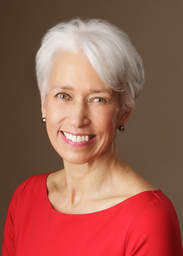2017-18 Series
|
Friday, September 15, 2017
Nina G. Jablonski "Human Skin Color is an Evolutionary Adaptation, Not a Racial Characteristic" 7:30 PM, Biology Building Auditorium (Room 127) Nina G. Jablonski is Evan Pugh University Professor of Anthropology at The Pennsylvania State University. A biological anthropologist by training, Jablonski pursues basic research on the evolution of adaptations of primates, including humans, to their environment. For the last 25 years, she has been most intrigued by questions in human evolution not directly answered by the fossil record, foremost among these being the evolution of human skin and skin pigmentation. From an initial interest in the evolution of skin pigmentation, Jablonski has pursued issues surrounding the meanings of skin color in modern life, notably the relationships to health and society. In addition to her scholarly articles on skin and skin color, Jablonski has written two popular books on the subject, Skin: A Natural History(2006) and Living Color: The Biological and Social Meaning of Skin Color (2012), both published by University of California Press. Jablonski received her A.B. in Biology at Bryn Mawr College in 1975 and her Ph.D. in Anthropology at the University of Washington in 1981. She is an elected Fellow of the American Academy of Arts and Sciences, the American Philosophical Society, and the American Association for the Advancement of Science, and a member of the Board on Behavioral, Cognitive, and Sensory Sciences (BBCSS) of the U.S. National Research Council. She is the recipient of an Alphonse Fletcher, Sr. Fellowship (2005), a Guggenheim Fellowship (2012), and an honorary doctorate from University of Stellenbosch in South Africa (2010) for her contribution to the worldwide fight against racism. Jablonski co-organized the Sun Safety Expert Meeting sponsored by the National Cancer Institute and the BBCSS in December 2016, and is a lead co-author on an upcoming NCI-sponsored white paper on sun safety behaviors. Her current research and educational projects are funded by grants from the National Science Foundation and the Robert Wood Johnson Foundation and include a project examining the factors that affect vitamin D status in healthy young adults in South Africa, the writing of a graphic novel about skin color for South African middle school children, and the development of a science summer camp curriculum for minority and underserved middle school students in the U.S. For more information about this talk, contact Chris Lynn in Evolutionary Studies. |
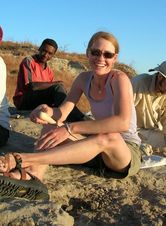
Thursday, October 12, 2017
Dr. Kristi Curry Rogers, Macalester College
"From Madagascar to Microscopes: Breathing Life into Dinosaurs"
7:30 PM - 2008 North Lawn Hall
Dr. Kristi Curry Rogers is a vertebrate paleontologist from Macalester College and holds research associate positions at the Denver Museum of Science and Nature, the Science Museum of Minnesota, and the Museum of the Rockies. She specializes in the long-necked dinosaurs called sauropods and has traveled around the globe in search of their bones.Kristi was awarded an NSF CAREER grant to investigate the effects of environmental stress on the bones of backboned animals (including dinosaurs).She is a member of the Society of Vertebrate Paleontology, and is actively involved in outreach activities related to paleontology and evolution.She has been a consultant and on-screen expert for programs aired on PBS, BBC Horizon, the Discovery Channel, and the National Geographic Channel.
For more information about this presentation, contact Tom Tobin in Geological Sciences.
Dr. Kristi Curry Rogers, Macalester College
"From Madagascar to Microscopes: Breathing Life into Dinosaurs"
7:30 PM - 2008 North Lawn Hall
Dr. Kristi Curry Rogers is a vertebrate paleontologist from Macalester College and holds research associate positions at the Denver Museum of Science and Nature, the Science Museum of Minnesota, and the Museum of the Rockies. She specializes in the long-necked dinosaurs called sauropods and has traveled around the globe in search of their bones.Kristi was awarded an NSF CAREER grant to investigate the effects of environmental stress on the bones of backboned animals (including dinosaurs).She is a member of the Society of Vertebrate Paleontology, and is actively involved in outreach activities related to paleontology and evolution.She has been a consultant and on-screen expert for programs aired on PBS, BBC Horizon, the Discovery Channel, and the National Geographic Channel.
For more information about this presentation, contact Tom Tobin in Geological Sciences.
Thursday, November 9, 2017
Speaking Evolution, Leslie Rissler
7:30 PM - 2011 North Lawn Hall
Speaking Evolution ALLELE has collaborated with the producers of the Discovering Alabama public television series to create a new television program: Speaking Evolution. This new program features many of our past ALLELE speakers as they candidly ponder the question, “Why does evolution by natural selection look like design?” Their answers are often surprising and always inspiring. A spectacular array of high definition footage from around our campus and around our state corroborates the speakers’ interviews. Speaking Evolution is narrated by NPR National Correspondent Debbie Elliott and produced by the Emmy award winning writers and producers of Discovering Alabama. After the presentation, a panel of science advisors will take questions from the audience. Speaking Evolution is a production of the Alabama Museum of Natural History with support from The University of Alabama College of Arts and Sciences, The University of Alabama Office of Academic Affairs, The University of Alabama Office for Research and Economic Development, and ALLELE—Alabama Lectures on Life’s evolution.
For more information about this presentation, contact Roger Reid at Discovering Alabama.
Speaking Evolution, Leslie Rissler
7:30 PM - 2011 North Lawn Hall
Speaking Evolution ALLELE has collaborated with the producers of the Discovering Alabama public television series to create a new television program: Speaking Evolution. This new program features many of our past ALLELE speakers as they candidly ponder the question, “Why does evolution by natural selection look like design?” Their answers are often surprising and always inspiring. A spectacular array of high definition footage from around our campus and around our state corroborates the speakers’ interviews. Speaking Evolution is narrated by NPR National Correspondent Debbie Elliott and produced by the Emmy award winning writers and producers of Discovering Alabama. After the presentation, a panel of science advisors will take questions from the audience. Speaking Evolution is a production of the Alabama Museum of Natural History with support from The University of Alabama College of Arts and Sciences, The University of Alabama Office of Academic Affairs, The University of Alabama Office for Research and Economic Development, and ALLELE—Alabama Lectures on Life’s evolution.
For more information about this presentation, contact Roger Reid at Discovering Alabama.
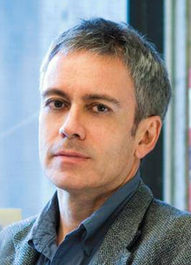
Thursday, February 8, 2018
Bernard Crespi, Simon Fraser University
"Where Darwin Meets Freud: The Evolutionary and Psychological Genetics of Human Cognitive Architecture”
7:30 PM - 1011 North Lawn Hall
Dr. Bernard Crespi attended the University of Chicago for his undergraduate degree, and the University of Michigan, Ann Arbor for his PhD, under the supervision of Dr. Richard D. Alexander. He then took up NSF post-doctoral positions at the University of New South Wales (with Dr. Ross Crozier), the University of Oxford (with Dr. William D. Hamilton), and Cornell University (with Dr. Richard Harrison). In 1992, he joined the faculty of Simon Fraser University in Vancouver, British Columbia, Canada. Bernie's research has focused mainly on the evolution of social behavior, at levels from DNA to neuroscience, psychiatry and evolutionary medicine. His most recent studies involve testing hypotheses for the evolutionary-genetic underpinnings of autism and schizophrenia.
For more information about this talk, contact Anthony Buhr in Communicative Disorders.
Bernard Crespi, Simon Fraser University
"Where Darwin Meets Freud: The Evolutionary and Psychological Genetics of Human Cognitive Architecture”
7:30 PM - 1011 North Lawn Hall
Dr. Bernard Crespi attended the University of Chicago for his undergraduate degree, and the University of Michigan, Ann Arbor for his PhD, under the supervision of Dr. Richard D. Alexander. He then took up NSF post-doctoral positions at the University of New South Wales (with Dr. Ross Crozier), the University of Oxford (with Dr. William D. Hamilton), and Cornell University (with Dr. Richard Harrison). In 1992, he joined the faculty of Simon Fraser University in Vancouver, British Columbia, Canada. Bernie's research has focused mainly on the evolution of social behavior, at levels from DNA to neuroscience, psychiatry and evolutionary medicine. His most recent studies involve testing hypotheses for the evolutionary-genetic underpinnings of autism and schizophrenia.
For more information about this talk, contact Anthony Buhr in Communicative Disorders.
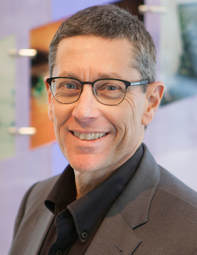
Thursday, March 1, 2018
Gene Robinson, University of Illinois at Urbana-Champaign
“Me to We: Searching for the Genetic Roots of Social Life”
7:30 PM - 1011 North Lawn Hall
CANCELED
Gene E. Robinson obtained his Ph.D. from Cornell University in 1986 and joined the faculty of the University of Illinois at Urbana-Champaign in 1989. He holds a University Swanlund Chair and Center for Advanced Study Professorship, is director (since 2011) of the Carl R. Woese Institute for Genomic Biology (IGB) and director (since 1990) of the Bee Research Facility, and is a former director of the campus Neuroscience Program (2001-2011). Robinson pioneered the application of genomics to the study of social behavior, led the effort to sequence the honey bee genome, authored or co-authored over 300 publications, and has trained 29 postdoctoral associates and 23 doctoral students, over half with faculty positions in academia. He served on the National Institute of Mental Health Advisory Council and has past and current appointments on scientific advisory boards for companies with significant interests in genomics.Dr. Robinson’s honors include: Fellow and Founders Memorial Award, Entomological Society of America; Fellow and Distinguished Behaviorist, Animal Behavior Society; Distinguished Scientist Award, International Behavioral Genetics Society; Guggenheim Fellowship; Fulbright Fellowship; NIH Pioneer Award; Honorary Doctorate, Hebrew University; Fellow, American Academy of Arts & Sciences; and member, US National Academy of Sciences.
For more information about this talk, contact Jeffrey Lozier in Biological Sciences.
Gene Robinson, University of Illinois at Urbana-Champaign
“Me to We: Searching for the Genetic Roots of Social Life”
7:30 PM - 1011 North Lawn Hall
CANCELED
Gene E. Robinson obtained his Ph.D. from Cornell University in 1986 and joined the faculty of the University of Illinois at Urbana-Champaign in 1989. He holds a University Swanlund Chair and Center for Advanced Study Professorship, is director (since 2011) of the Carl R. Woese Institute for Genomic Biology (IGB) and director (since 1990) of the Bee Research Facility, and is a former director of the campus Neuroscience Program (2001-2011). Robinson pioneered the application of genomics to the study of social behavior, led the effort to sequence the honey bee genome, authored or co-authored over 300 publications, and has trained 29 postdoctoral associates and 23 doctoral students, over half with faculty positions in academia. He served on the National Institute of Mental Health Advisory Council and has past and current appointments on scientific advisory boards for companies with significant interests in genomics.Dr. Robinson’s honors include: Fellow and Founders Memorial Award, Entomological Society of America; Fellow and Distinguished Behaviorist, Animal Behavior Society; Distinguished Scientist Award, International Behavioral Genetics Society; Guggenheim Fellowship; Fulbright Fellowship; NIH Pioneer Award; Honorary Doctorate, Hebrew University; Fellow, American Academy of Arts & Sciences; and member, US National Academy of Sciences.
For more information about this talk, contact Jeffrey Lozier in Biological Sciences.
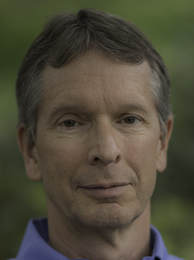
Thursday, April 12, 2018
Donald Hoffman, UC Irvine
"The Case Against Reality: Why Evolution Hides The Truth From Our Eyes"
7:30 PM - 1011 North Lawn Hall
Donald Hoffman is a cognitive scientist and author of more than 100 scientific papers and three books, including Visual Intelligence: How We Create What We See (W.W. Norton, 2000). He received his BA from UCLA in Quantitative Psychology and his Ph.D. from MIT in Computational Psychology. He joined the faculty of UC Irvine in 1983, where he is now a full professor in the departments of cognitive science, computer science and philosophy. He received a Distinguished Scientific Award of the American Psychological Association for early career research into visual perception, the Rustum Roy Award of the Chopra Foundation, and the Troland Research Award of the US National Academy of Sciences. He has a TED Talk entitled “Do we see reality as it is?”
For more information about this talk, contact Anthony Buhr in Communicative Disorders.
Donald Hoffman, UC Irvine
"The Case Against Reality: Why Evolution Hides The Truth From Our Eyes"
7:30 PM - 1011 North Lawn Hall
Donald Hoffman is a cognitive scientist and author of more than 100 scientific papers and three books, including Visual Intelligence: How We Create What We See (W.W. Norton, 2000). He received his BA from UCLA in Quantitative Psychology and his Ph.D. from MIT in Computational Psychology. He joined the faculty of UC Irvine in 1983, where he is now a full professor in the departments of cognitive science, computer science and philosophy. He received a Distinguished Scientific Award of the American Psychological Association for early career research into visual perception, the Rustum Roy Award of the Chopra Foundation, and the Troland Research Award of the US National Academy of Sciences. He has a TED Talk entitled “Do we see reality as it is?”
For more information about this talk, contact Anthony Buhr in Communicative Disorders.

